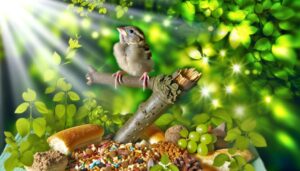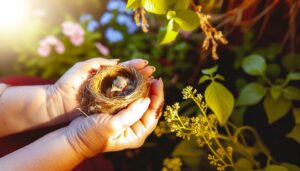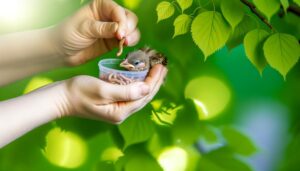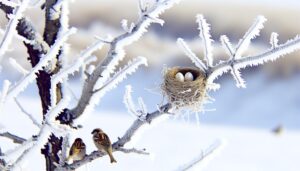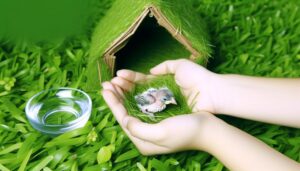Is Peanut Butter Safe for Baby Sparrows to Eat?
No, you shouldn't feed a baby sparrow peanut butter. Its sticky texture poses choking hazards, making it difficult for the bird to swallow.
Additionally, peanut butter's high fat and protein content can cause nutritional imbalances and digestive issues. Baby sparrows need a high-protein diet primarily consisting of insects to support rapid growth and development.
Instead, try feeding them softened dog kibble, boiled eggs, or mealworms. These alternatives provide essential nutrients without the risks.
Maintaining a proper diet is vital for their health and wellbeing. For more detailed insights on suitable feeding practices, keep following the guidelines provided.
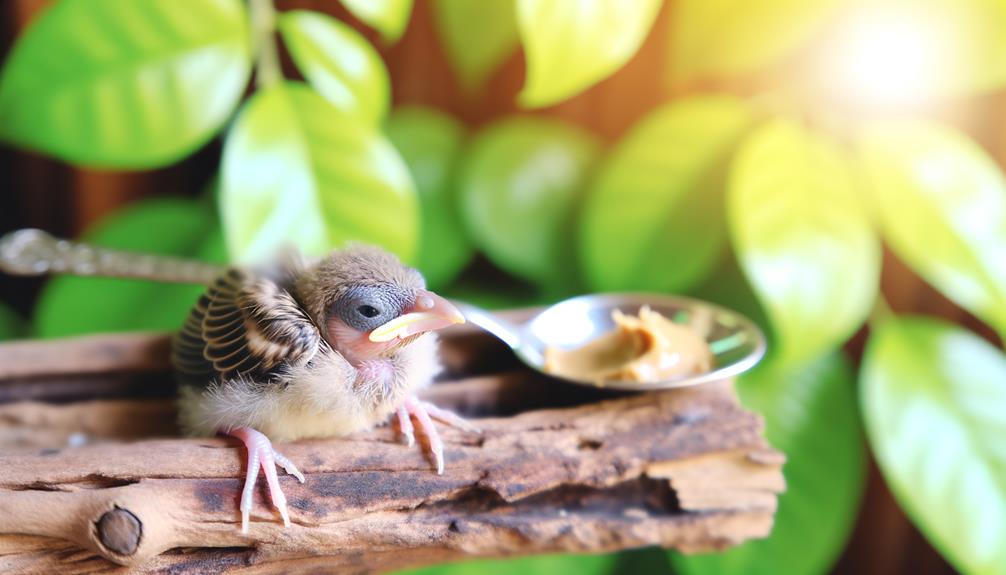
Key Takeaways
- Peanut butter poses a choking risk to baby sparrows due to its sticky texture.
- The high fat content in peanut butter can lead to nutritional imbalances.
- Peanut butter lacks essential nutrients needed for baby sparrow growth and development.
- The viscosity of peanut butter can make swallowing difficult for baby sparrows.
- Peanut butter is not a suitable food choice for baby sparrows and can cause digestive issues.
Understanding Baby Sparrow Diet
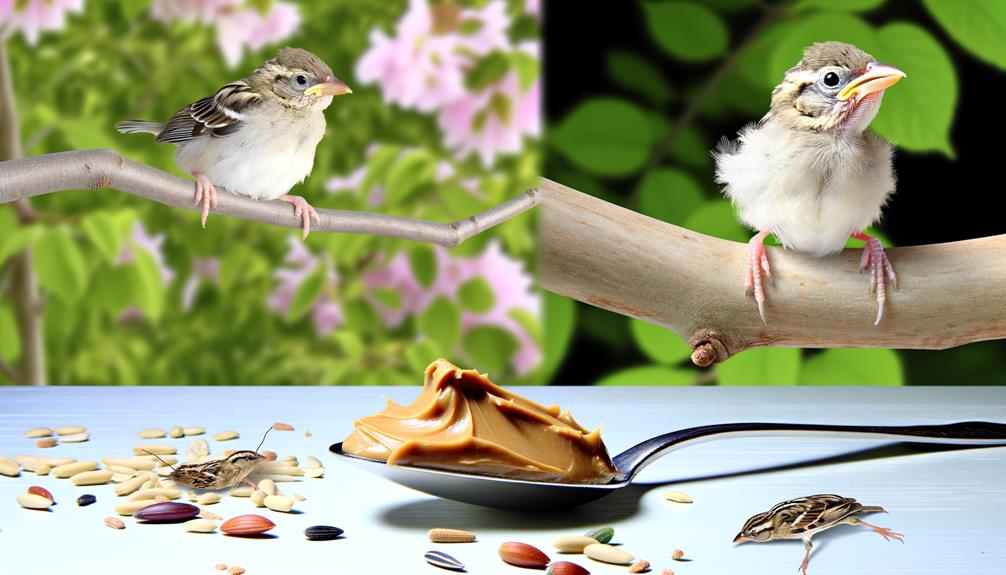
To understand a baby sparrow's diet, recognizing that these fledglings primarily rely on a high-protein intake is essential for their rapid growth and development.
You'll find that baby sparrows depend heavily on insects and other protein-rich foods provided by their parents. This protein is vital for muscle formation and feather growth, guaranteeing they're strong enough to fledge.
As they grow, their diet gradually expands to include seeds and fruits, but the initial focus remains on high-protein sources.
Nutritional Needs of Baby Sparrows
You need to guarantee baby sparrows get adequate protein to support rapid growth and development. They also require essential vitamins like A, D, and E to maintain healthy immune and metabolic functions.
An appropriate diet typically consists of insects, seeds, and fruits, which provide a balanced mix of nutrients.
Protein Requirements
A baby sparrow's protein requirements are essential for its rapid growth and development, necessitating a diet rich in high-quality protein sources. You should focus on providing insects like mealworms, which are packed with the necessary proteins.
These proteins are vital for muscle development, feather formation, and overall health. By ensuring a protein-rich diet, you're supporting the bird's metabolic functions and immune system.
Avoid processed foods or items with added sugars, as they can hinder development. If you're caring for an orphaned sparrow, consult a wildlife rehabilitator or avian expert for precise dietary guidelines.
Meeting these protein needs will help the baby sparrow grow strong and thrive in its natural environment, preparing it for a successful adulthood.
Essential Vitamins
In addition to high-quality protein, baby sparrows require a range of essential vitamins to support their growth and overall health.
Vitamin A is pivotal for their vision and immune system. Without it, they can suffer from poor feather development and increased susceptibility to infections.
Vitamin D is essential for calcium absorption, which strengthens their bones and beaks.
Vitamin E acts as an antioxidant, protecting their cells from damage.
B vitamins, including B1, B2, and B6, play a significant role in energy metabolism and nervous system function.
Ensuring these vitamins are part of a baby sparrow's diet helps in their proper development and resilience.
Keep their nutritional needs in mind to promote their well-being and growth effectively.
Appropriate Diet
To safeguard the thriving of baby sparrows, their diet must be carefully balanced to provide the specific nutrients vital for their rapid growth and development. You'll need to focus on high-protein foods, as baby sparrows require a protein-rich diet to support their quick metabolism.
Insects like mealworms and crickets are excellent choices. Additionally, incorporate soft, moisture-rich foods like soaked dog or cat kibble. Avoid feeding them seeds and grains initially, as their digestive systems aren't mature enough to handle these.
Make sure to provide small, frequent feedings to mimic their natural feeding patterns. Remember, a balanced diet helps build strong bones, develop feathers, and support overall health. Your attention to their dietary needs ensures they grow into healthy adult sparrows.
Common Foods for Baby Sparrows
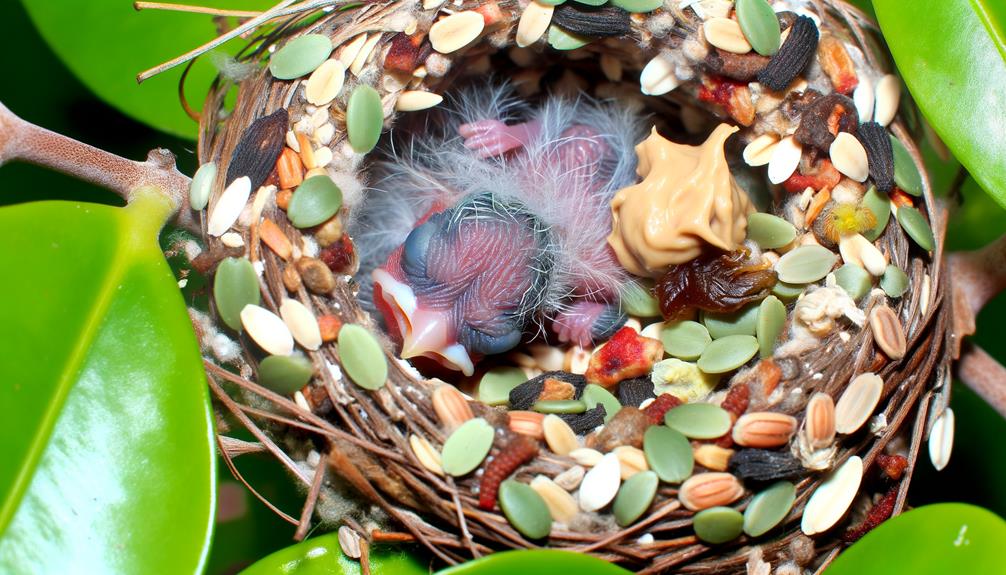
Baby sparrows flourish on a diet primarily composed of insects, high-protein foods vital for their rapid growth and development. You should aim to provide a variety of protein-rich insects like mealworms, crickets, and small caterpillars. Additionally, finely chopped, hard-boiled eggs can supplement their protein intake.
Soft fruits such as berries and small pieces of apples can offer essential vitamins. Make sure that any food you provide is small enough to prevent choking and easily digestible. You can also consider specialized baby bird formulas available at pet stores, formulated to meet their nutritional needs.
Hydration is important, so offer water through a dropper. By providing these common foods, you'll help guarantee baby sparrows grow healthy and strong.
Risks of Inappropriate Foods
Feeding a baby sparrow inappropriate foods like peanut butter can lead to significant digestive health concerns, including blockages and difficulty digesting high-fat content.
You'll also risk causing nutritional deficiencies, as baby sparrows require a specific balance of nutrients essential for proper growth and development.
It's important to provide them with a diet that mimics their natural food sources to guarantee their well-being.
Digestive Health Concerns
Providing inappropriate foods like peanut butter to a baby sparrow can lead to severe digestive health concerns, including blockages and malnutrition. Peanut butter, due to its sticky texture, can cause an obstruction in the tiny digestive tract of a baby sparrow, making it difficult for them to process other foods.
This blockage can result in a lack of essential nutrients, as the bird is unable to absorb what it needs from its limited diet. Additionally, the high fat content in peanut butter can overload the sparrow's digestive system, leading to further complications.
It's essential to understand that baby sparrows have specific dietary requirements, and feeding them unsuitable foods can jeopardize their growth and survival. Always consult avian experts for proper feeding guidelines.
Nutritional Deficiency Risks
Inappropriate foods like peanut butter can lead to significant nutritional deficiencies in baby sparrows, severely impacting their growth and overall health. You need to be aware that peanut butter lacks essential nutrients required for their development. Here's a quick comparison to illustrate:
| Nutrient | Peanut Butter | Essential for Sparrows |
|---|---|---|
| Protein Quality | Low | High |
| Calcium | Low | High |
| Vitamins A & D | Absent | Necessary |
| Omega-3 Fatty Acids | Low | High |
| Fiber | Low | Moderate |
Feeding them inappropriate foods can result in weak bones, poor feather development, and compromised immune systems. By understanding these deficiencies, you can make sure baby sparrows receive the right diet, fostering their growth and well-being.
Peanut Butter Ingredients
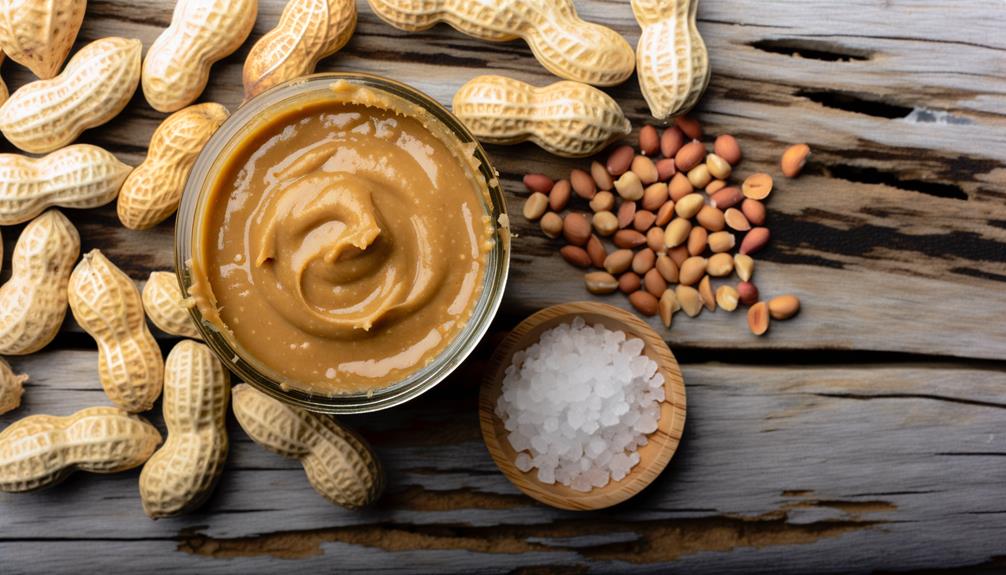
Peanut butter, primarily composed of ground roasted peanuts, often includes additional ingredients like sugar, salt, and hydrogenated oils to enhance flavor and texture.
Sugar adds sweetness, making it more palatable, while salt enhances the overall taste. Hydrogenated oils stabilize the mixture, preventing separation and extending shelf life.
Some brands might add emulsifiers like mono- and diglycerides to improve consistency.
Understanding these ingredients is crucial when considering whether peanut butter is suitable for baby sparrows. The added sugars and salt might pose health risks, while hydrogenated oils contain trans fats that could affect their delicate systems.
Nutritional Value of Peanut Butter
When examining the nutritional value of peanut butter, you'll find it's rich in proteins, healthy fats, vitamins, and minerals, essential for growth and energy. It provides a balanced mix of macronutrients and micronutrients, making it a versatile food option. Here's a detailed breakdown:
| Nutrient | Amount per 2 tbsp | % Daily Value |
|---|---|---|
| Protein | 8 grams | 16% |
| Healthy Fats | 16 grams | 24% |
| Vitamin E | 2.9 mg | 15% |
| Magnesium | 49 mg | 12% |
| Fiber | 2 grams | 8% |
These nutrients contribute to bodily functions such as muscle repair, energy production, and immune system support. Understanding this helps you appreciate peanut butter's role in a balanced diet, especially when considering its potential benefits and suitability for various dietary needs.
Potential Hazards of Peanut Butter
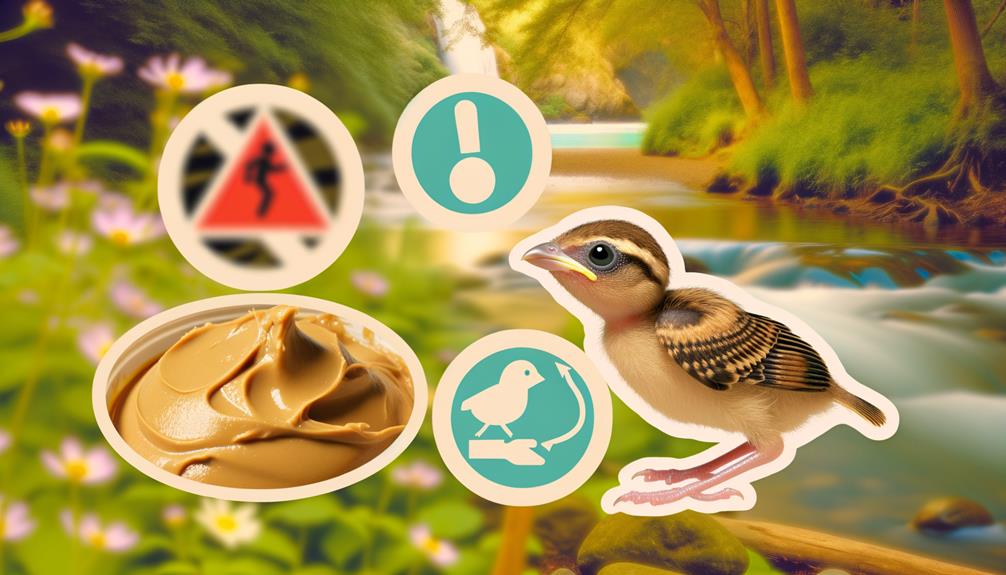
You should be aware that peanut butter poses significant choking risks due to its sticky texture, which can obstruct a baby sparrow's airway.
Additionally, its high fat and protein content can lead to nutritional imbalances, disrupting the bird's growth and development.
These hazards make peanut butter an unsuitable food choice for baby sparrows.
Choking Risk Factors
One significant risk of feeding peanut butter to a baby sparrow is the potential for it to cause choking due to its sticky and thick consistency. Baby sparrows have small, delicate throats, making them particularly vulnerable to obstructions. When you offer something as adhesive as peanut butter, you're increasing the likelihood of it sticking in the bird's airway, which can be life-threatening.
Consider these risk factors:
- Viscosity: Peanut butter's high viscosity can make it hard for the baby bird to swallow.
- Size: Even small amounts can form a blockage.
- Lack of water: Birds need water to help move food through their digestive system, and peanut butter can absorb moisture, exacerbating the risk.
Always prioritize safe, appropriate foods for baby sparrows.
Nutritional Imbalances
Peanut butter can lead to nutritional imbalances in baby sparrows because it lacks the essential nutrients they need for healthy growth and development. Sparrows require a diet rich in proteins, vitamins, and minerals, which peanut butter fails to provide.
Although it contains some protein and fat, it doesn't offer the right balance of nutrients essential for their delicate systems. Feeding baby sparrows peanut butter can result in deficiencies that might impair their bone development, feather growth, and overall health.
Their natural diet consists mainly of insects and seeds, which are specifically suited to their nutritional needs. By offering inappropriate foods like peanut butter, you risk compromising their health and survival, ultimately doing more harm than good.
Digestive Issues in Baby Sparrows
Baby sparrows often experience digestive issues when consuming foods inappropriate for their delicate systems. Their young digestive tracts aren't equipped to handle complex or fatty foods like peanut butter.
When you feed them unsuitable items, it can lead to serious health complications such as:
- Impaction: Food gets stuck in their digestive tract, causing blockages.
- Diarrhea: Inappropriate foods can upset their stomach, leading to dehydration.
- Malabsorption: Their bodies can't properly absorb nutrients, leading to deficiencies.
Understanding these potential problems highlights the importance of providing baby sparrows with a diet that aligns with their biological needs.
You play a vital role in ensuring their health and growth by carefully selecting their food. Prioritize their delicate systems to foster their well-being.
Safe Alternatives to Peanut Butter
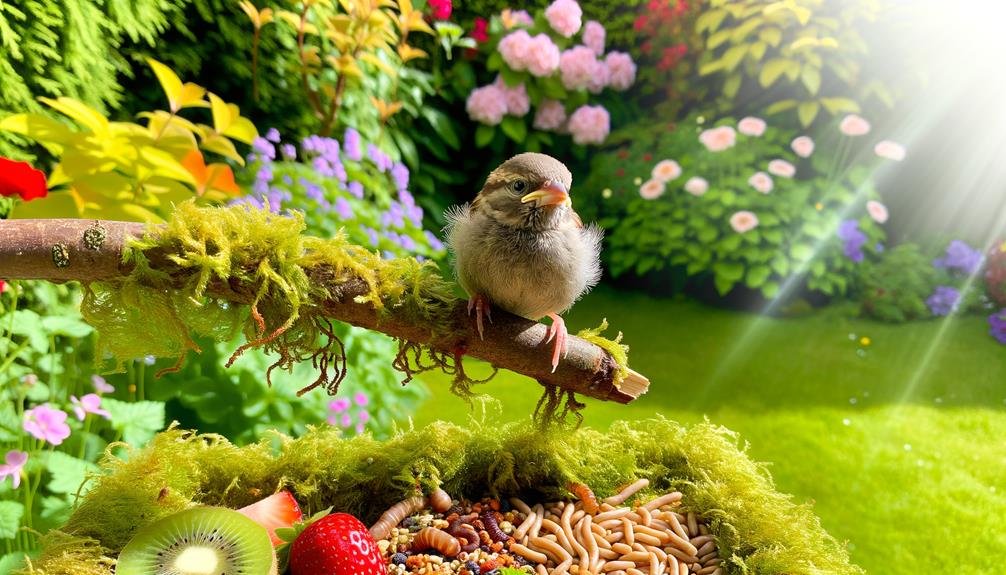
To safeguard the health and growth of baby sparrows, consider offering safe alternatives to peanut butter that meet their nutritional needs and are gentle on their digestive systems. High-protein foods and easily digestible options ensure proper development. Here are some recommended alternatives:
| Alternative Food | Nutritional Benefit | Digestive Impact |
|---|---|---|
| Boiled Eggs | High in protein | Easy to digest |
| Mealworms | Rich in essential fats | Natural diet component |
| Oatmeal (cooked) | Contains fiber and carbs | Gentle on stomach |
| Fruits (mashed) | Vitamins and minerals | Easily digestible |
| Specialized Bird Formula | Balanced nutrition | Formulated for birds |
These alternatives provide essential nutrients and align with a baby sparrow's natural dietary requirements, fostering healthy growth.
Preparing Food for Baby Sparrows
When preparing food for baby sparrows, make sure you provide a balanced diet that mimics their natural feeding habits to promote peak growth and development. You'll need to create a mixture that's high in protein, as this is essential for their rapid growth.
Here are three essential components to include:
- Insects: Crushed mealworms or small crickets provide important protein and nutrients.
- Egg yolk: A small amount of hard-boiled egg yolk offers an excellent protein source.
- Soaked dog or cat kibble: These can be softened in water to provide necessary vitamins and minerals.
Ensure the food is finely chopped or mashed to prevent choking. By offering a varied and nutritionally rich diet, you'll help the baby sparrows thrive.
Feeding Tips for Baby Sparrows
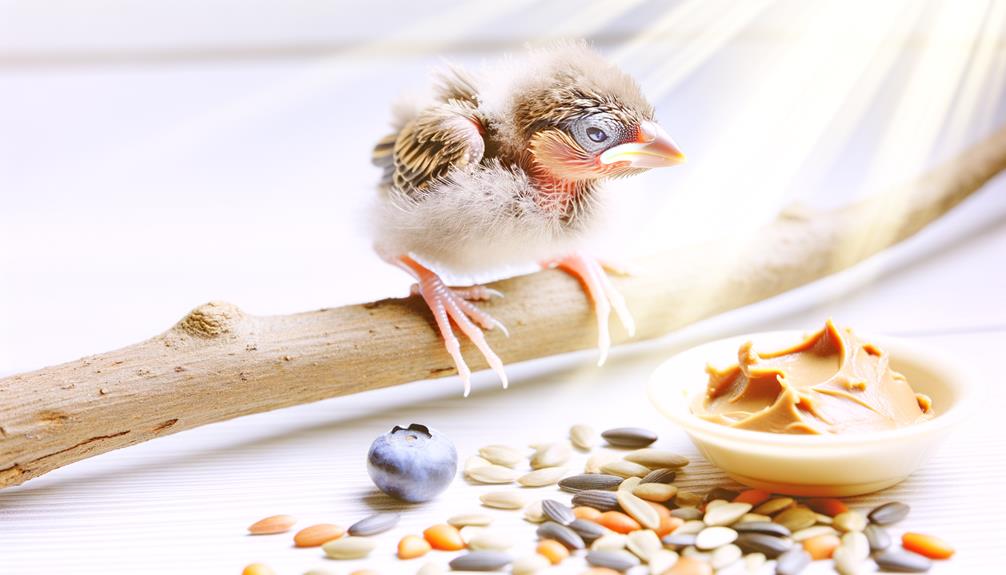
Ensuring that young sparrows receive frequent, small feedings throughout the day is essential for their healthy development. You'll need to provide a balanced diet that simulates what they'd receive in the wild. Be sure to use a proper feeding schedule, especially during their early stages.
| Time of Day | Feeding Amount |
|---|---|
| Morning | 2-3 drops |
| Midday | 2-3 drops |
| Afternoon | 2-3 drops |
| Evening | 2-3 drops |
Use a dropper or a small syringe to feed them. Make sure the food is at room temperature. Avoid overfeeding, as it can cause digestive issues. Clean the feeding tools thoroughly after each use to prevent bacterial infections. Monitor their growth and adjust the feeding amount as they develop.
Conclusion
To sum up, while it might seem like a quick fix, feeding baby sparrows peanut butter isn't safe due to their specific nutritional needs and potential digestive issues. You might think, 'But peanut butter is nutritious,' yet it's unsuitable for their delicate systems.
Instead, consider alternatives like mashed hard-boiled eggs or special baby bird food. Ensuring you provide appropriate food helps baby sparrows thrive, promoting healthy growth and development. Always prioritize their unique dietary requirements for the best care.

